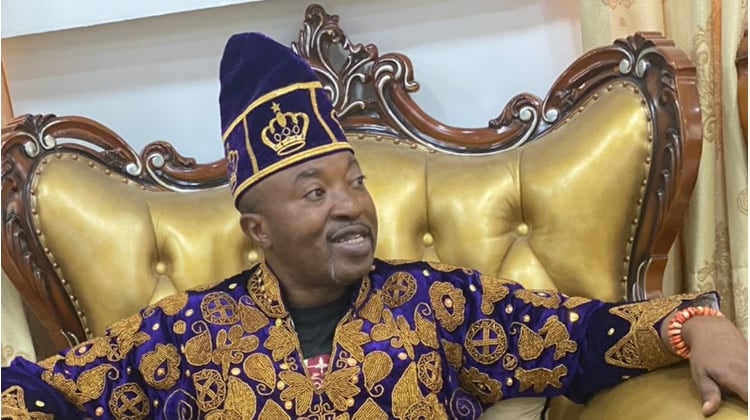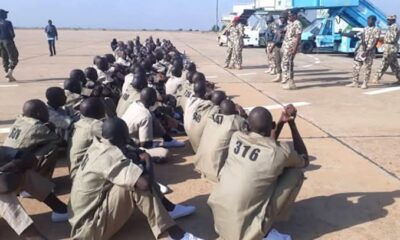The Oluwo of Iwo, Oba Abdulrasheed Akanbi, has come under heavy fire from his former wife, Queen Chanel Chin, who branded him a “deadbeat father” after the monarch accused the Ooni of Ife, Oba Adeyeye Ogunwusi, of conspiring with her to orchestrate his downfall.
Born in Canada to Jamaican parents, Chanel is the daughter of reggae star Ludlow “Bobo Zaro” Chin, renowned for collaborations with artistes such as Capleton.
Before her marriage to the Iwo monarch, she worked as a model and entrepreneur.
She reportedly met the king at a party in Lagos during a 2015 visit to Nigeria, but their union collapsed in December 2019 after almost three years.
In a widely publicised divorce statement, Oluwo premised the break-up on “personal irreconcilable differences.”
The monarch reportedly forced the queen out of the palace leading to heated public exchanges via social media in which the queen accused Oluwo of emotional abuse.
The controversy reignited on Tuesday after a video posted on Oluwo’s Instagram page went viral.
In the clip, the Iwo monarch alleged that the Ooni masterminded a plot against him by “packaging” Chanel for marriage, claiming the relationship was a setup designed to destroy him.
“He (Ooni) was looking for my downfall, and the next thing, they packaged a woman for me. I don’t know her from Canada, but it was packaged for me. It was a setup,” Oluwo alleged.
The monarch further claimed that Queen Chanel poisoned him twice, attempted to assassinate him, and bore a child whose paternity he now doubts.
“She had a child, which I don’t even know if it’s mine. I have to confirm that through DNA,” he said, accusing the Ooni of housing his former wife and allegedly having an affair with her.
Oluwo also declared that no power, traditional or spiritual, could kill him.
“Sango cannot kill me; Ogun cannot kill me. Only God determines when someone will die,” he insisted.
All attempts to reach the Ooni’s media aide, Moses Olafare, for comments were unsuccessful.
But in a statement shared on her Instagram page on Friday, Queen Chanel dismissed Oluwo’s allegations as “false, misleading, and damaging to the sacred Yoruba traditional institution.”
She clarified that she was introduced to the monarch by a respected Lagos oba, not the Ooni of Ife, as claimed.
“I was introduced to Mr Akanbi by a respected Lagos monarch, not by the Ooni of Ife. During my time as Olori Oluwo, I regarded this Lagos monarch as my Royal Father and still do with respect,” she said.
Chanel went further to accuse the monarch of abandoning their son, Prince Oduduwa, for over five years, describing him as a neglectful father.
“Mr Akanbi has been absent from Prince Oduduwa’s life for over five years. He only resurfaced in August this year in Canada, refused to sign passport papers, but dropped $500 – the first support Oduduwa ever received from him since we left the palace,” she revealed.
She urged the public to disregard the monarch’s claims, calling on traditional institutions to caution him.
“This shall be my final statement on the matter. Prince Oduduwa remains my beloved son, and I hold the Yoruba people in deep love and respect,” she added.
Marriage built on falsehood
Recall that in a 2020 interview with Saturday PUNCH, Queen Chanel described her marriage to Oluwo as one built on lies.
She denied allegations of infidelity and poisoning, stressing that she was used to boost the monarch’s public image due to her Canadian background.
“He used me to build his profile. People didn’t even know him before. He used me as a show horse, saying, ‘My wife is Canadian.’ He even named our son Oduduwa, a name elders later advised me to change,” she recounted.
Chanel maintained that contrary to Oluwo’s claims, they first met in Lagos at a party in 2015—not in Canada.
With both sides trading allegations, the bitter feud between Oluwo and his ex-wife has once again spilled into the public space, dragging the revered Ooni of Ife into the storm.
punch.ng
FOLLOW US ON:
FACEBOOK
TWITTER
PINTEREST
TIKTOK
YOUTUBE
LINKEDIN
TUMBLR
INSTAGRAM































